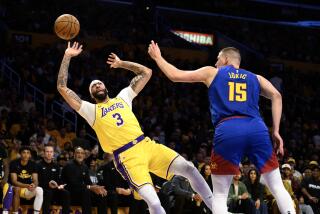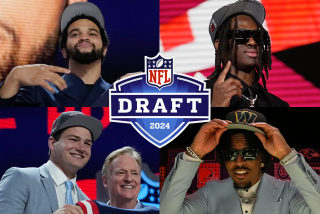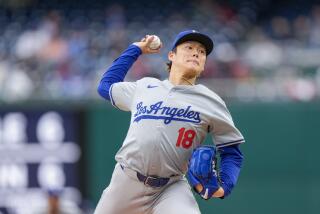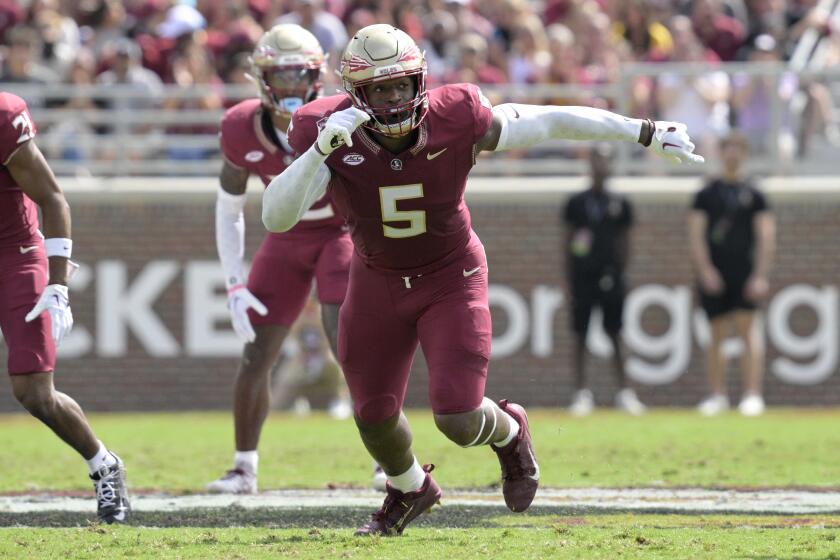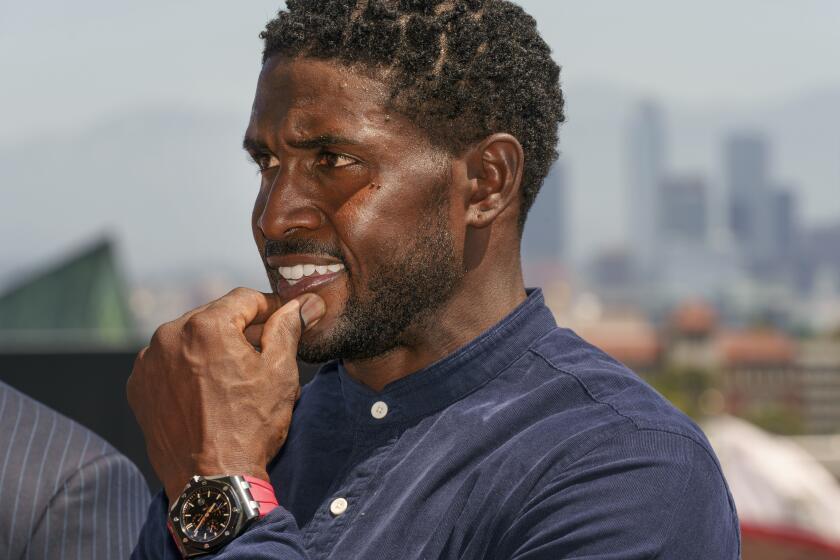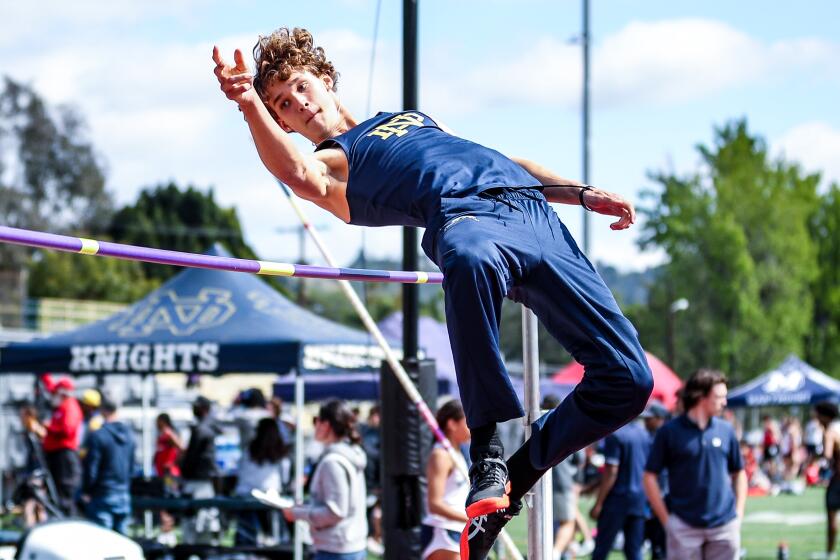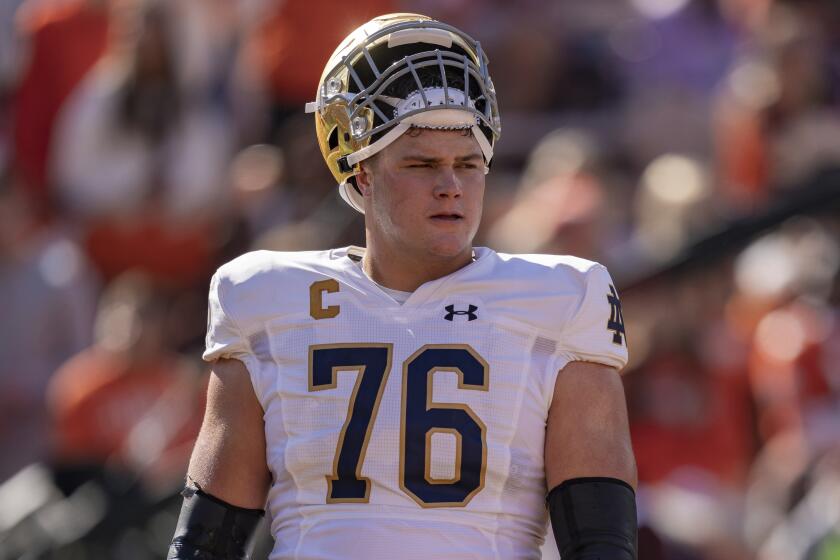The Pressure Is on for New Dodger Gross
Kevin Gross knows what you are wondering. It is the same thing everybody wonders about him.
Yes, on Aug. 10, 1987, while pitching for the Philadelphia Phillies, he taped a small piece of sandpaper to the inside of his glove.
“Right here near the palm,” he says, pointing to the heel of the glove.
And yes, he was using the sandpaper to scuff the baseball. He ground the ball into the glove, where the sandpaper would cut the cover.
“It was strong sandpaper,” he says. “A couple of rotations would do it.”
No, he has no idea how the umpires knew the sandpaper was in there. After an embarrassing scene on the mound, he was caught and eventually suspended for 10 games.
“The sandpaper was black, the glove was black . . . there’s no way they could have known about it unless somebody tipped them off,” he says. “I was set up.”
Yes, he acknowledges that it was stupid, because he only scuffed 12 pitches in his entire life and didn’t throw any of them for strikes.
“Dumbest thing I ever did,” he says. “Not only was it wrong, but it didn’t even help me. Really dumb.”
But no, that is only part of the story.
“I was cheating, but I wasn’t cheating to get ahead,” he says. “I was cheating to keep from getting buried.”
He says he could barely walk and was trying to pitch despite a herniated disk in his lower back that bothered him the entire season.
“At one point that season, my wife dressed me for four weeks,” he says. “I could barely throw the ball, but I couldn’t stop pitching. If I get surgery, maybe I never pitch again. If I go on the disabled list, maybe I never pitch again.
“I was fighting just to save my career.”
Gross says the scuffed-ball incident is representative of an attitude that has haunted him much of his career.
“I feel like if there’s any way I can pitch, I have to pitch,” he says. “I can’t sit down for nothing small. I am paid to compete. I will do anything to go out there. Sometimes that hurts me. But I don’t know any other way.”
The Dodgers signed Gross, 29, as a free agent from Montreal on Dec. 3. They are paying him $6.4 million for the next three seasons not simply because of how he pitches, but when he pitches, which is whenever it is his turn, despite broken fingers, sprained Achilles’ tendons, sprained right knees, a bad back . . .
“Guys look at me funny, but what can I do?” Gross says. “Baseball is still a kid’s game to me. Eat a pizza, drink a Coke and get out there on the mound and pitch whenever you can.”
Said Fred Claire, Dodger executive vice president: “It was a matter of filling a need. At the time, we didn’t know about Tim Belcher, we didn’t know about Orel Hershiser . . . and we had not yet traded for Bob Ojeda.
“Here was a guy who we knew was a workhorse with ability. We had to have him.”
About the only thing tougher than Gross’ arm, which has accounted for more than 200 innings in five of the last six years, is his temperament. This was not lost on the Dodgers, who are hoping to replace the intimidating clubhouse presence of Kirk Gibson.
If nothing else, Gross once beat up Gibson.
“Oh, it wasn’t that bad,” says Gross, who is 6 feet 5 and 215 pounds.
Fans at Dodger Stadium on May 31, 1989, would disagree. Gross, pitching for the Expos, tackled Gibson as he charged after Expo pitcher Pascual Perez.
“The only thing that happened was, I got him on the ground and said, ‘Don’t bleeping move,’ ” Gross recounted. “He looked up at me and said, ‘Grossie, how in the hell am I going to move?’ ”
Gross and Gibson are friends today, which figures. Gross plays hard. He is as intense in the dugout as on the field. The only thing he hates more than losing is the thought of backing down.
In his eight-year career, he has hit more batters, 54, than any other two Dodger starting pitchers combined.
“I have never, ever taken a ball and said, ‘I’m going to drill this guy,’ ” Gross says. “But I have taken the ball and said, ‘If this guy doesn’t move, I’ll hit him.’ I don’t throw 95 m.p.h. I don’t have a 12-inch sinker.
“For me to be successful, my ball has to move. And when it moves in, sometimes I nick guys.”
Gross is proud that not once in his career has a batter charged the mound. He is so hard on himself, he doesn’t need anyone else attacking him.
“I have this attitude of wanting to win so bad . . . when I don’t, I get frustrated, and I get in trouble,” he says. “I yell at people from the mound. The batter looks at me funny, I’ll yell, ‘What the hell you looking at?’ The manager comes out to talk to me, I might yell at him.
“After games, I have thrown every stool in the clubhouse. I have turned over tables. I don’t know what was on them. When I get mad, I get mad.”
He sighs. “I don’t mean anything by it,” he says. “It’s just the way I feel in the heat of the battle.”
His temper is what he and the Dodgers blame for his 80-90 record and 4.02 earned-run average. He has what many players say are some of the best pitches in baseball, but because he quickly becomes angry at himself and loses concentration, he often pitches six good innings, then one very bad one.
“I’ll get out there and start having trouble with a pitch and, instead of changing that pitch, I will just try to throw it harder and harder,” Gross says. “I’m not going to do that anymore. I’m going to say, ‘OK, just make a different pitch.’ ”
The Dodgers hope this new attitude gets better results during the season than it has this spring. In Gross’ first four starts, he gave up 17 runs in 15 innings.
His poor showing led to a meeting with Manager Tom Lasorda, who had specifically asked for Gross last winter.
“I wanted to make sure he was not going to get down on himself,” Lasorda says. “I didn’t want him to be too tough on himself when things don’t go right for him this season. I want him to know we are behind him.”
The Dodgers might be able to change his mechanics, but it is doubtful they will completely change his demeanor.
“Kevin has always been the same way--always his own worst enemy,” says George Gross, his father and Little League coach when Kevin was growing up in Diamond Bar. Gross later moved to Fillmore, where he spent his high school years.
“Even today, I can watch his games on television and tell what is going to happen,” his father says. “Watch his hands. If he starts moving them over his hat real fast, then tightens his jaws, you know he’s headed for a bad inning. Guaranteed. I’m surprised more managers don’t see that coming. The boy is his own worst enemy.”
The teen-age Gross was so cocky, he would sometimes display the baseball to the hitter and shout, “This is for you!” before throwing it past him.
“He listened to nobody,” his father says. “He could throw a strike to home plate from center field, so he didn’t think he had to listen to anybody. Kids were intimidated.”
Gross was drafted by Philadelphia in 1981 from Oxnard College and was in the major leagues two seasons later. As the pressure increased, he began escaping through wildlife art.
“People may not look at me and think of an artist,” Gross says, “but it’s my way of getting away.”
In 1985 with the Philadelphia Phillies, Gross fell into a routine of painting throughout the night. That turned out to be his best season, 15-13 with a 3.41 ERA.
“I would get home from the games, put on some smooth music, sit in front of my canvas and paint all night,” Gross says. “In the morning, we would hear geese coming off a lake next to our house. It was the best summer of my career, and for a reason.”
Gross, who says family responsibilities have decreased his painting opportunities in recent years, is hoping for a similar experience this summer.
Gross says the pressure of being a Dodger is one thing he can handle. “That’s the one thing about me--I love the pressure,” he says. “I need butterflies to pitch well. My energy doesn’t come out until it needs to come out well.
“That’s why I love coming home and pitching for my family. Every night will be like a big game. I can’t wait.”
And Gross does seem to thrive on pressure.
“In Little League, he was especially famous for loading the bases in a crucial game, then striking out the side,” his father says. “It was almost like he would do it on purpose. Almost because he wanted to put pressure on himself.”
Last season, in late-inning situations with runners on base, Gross did not allow a hit in eight opposing at-bats. With runners in scoring position and two outs, opponents batted .182.
In non-pressure situations, he faltered. Batters leading off hit .301 against him.
“Regardless of the pressure, we’re all glad he’s home,” says Greg Ingram, a childhood friend. Ingram is part of a group of fans who will be at many of the games Gross starts. “Finally, we can cheer (Gross) at Dodger Stadium and not get into fights. We can scream and not have anybody scream at us or throw things at us or use harsh words on us.”
Woods says: “Here’s how much Kevin loves having us in the stands. When I was in San Francisco a couple of years ago, he struck out 12 guys and then gave me the game ball.”
Gross is ready to give away many more.
“People don’t realize what being here means to me,” Gross says. “Everything else is behind me now. I’m starting new at a place where I want to finish my career. I really, really want to do well. I know I will have my ups and downs, but I think now I can handle them.”
The Dodgers believe him. They simply hope he continues to believe in himself.
More to Read
Get our high school sports newsletter
Prep Rally is devoted to the SoCal high school sports experience, bringing you scores, stories and a behind-the-scenes look at what makes prep sports so popular.
You may occasionally receive promotional content from the Los Angeles Times.
